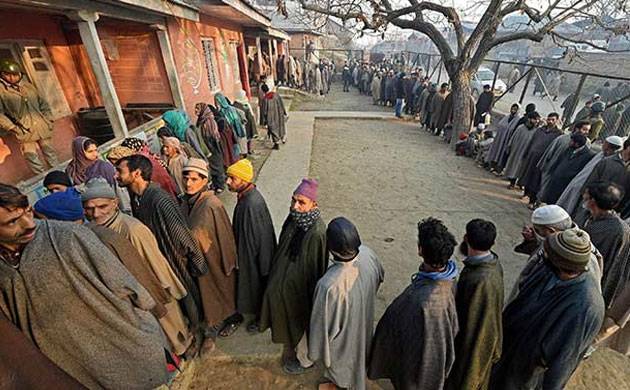The recently concluded by-polls for the Srinagar Parliamentary seat in Jammu and Kashmir saw a voter turnout of 7.1%, 8 deaths and hundreds injured in the ensuing violence. The re-polls saw an even more miserable turnout of hardly 2%.
This abstention by the citizens of Srinagar is akin to an act of democratic protest, wherein they have refused to repose faith with the Indian Parliament. This leads to larger concerns as to whether a people who question the Parliament and the democratic processes of the nation wish to be a part of the nation or not. If large sections of the people openly demand self-determination, what can a post-colonial state do? Does it recognise the right of a people who want to be the masters of their own destiny or do they send in the military and quash all this talk? What happens when the military is failing to stem the violence and anti-India sentiment?
Any debate on Kashmir is often ‘deficient’ without invoking the forced migration of the Kashmiri Pundits from the Valley. The unofficial numbers state that nearly 3000 Kashmiri Pundits were killed in the Valley in 1990 and a few lakh were forced to migrate (official figures put the death toll at 219). The death and suffering of Pundits is often used, in an unconscionable way, to justify the continued violence against Kashmiri Muslims in the state. In contrast, according to several human rights groups, nearly 80,000 Kashmiri Muslims have been killed since 1990. This was further reiterated in the US House of Representatives prior to the visit of then Indian PM, Atal Bihari Vajpayee, to the US in 2002. In an official statement in the J&K Assembly, the total number of people killed in Kashmir was placed at 44,000. This doesn’t include the many tens of thousands who have been injured, tortured, harassed, missing and had their livelihoods taken away from them. As protests in Kashmir flare up, many of the soi-disant nationalists in mainland India justify the continued violence against the Muslim people there by citing the plight of the Kashmiri Pundits.
Violence is never justified, and vengeance should rarely be a part of state policy, but even those who are supporters of retributive justice should be of the opinion that enough is enough. Surely, the Kashmiri Muslims have suffered as much, if not more than the Kashmiri Pundits. And the resolution of any conflict should not be predicated on blood-letting. What we have is a case of two communities who have suffered immensely, and a political system unwilling to do anything about it.
Separatist movements are not new to India. From its very inception, India has faced various separatist movements. From the Tamil secessionists in the 1950s to the Khalistan Movement in Punjab and the Naga Movement, which continues to this day, there have been numerous groups within India who have challenged the very concept of India. Each of these groups rebelled against the notion of an India defined by Hindi and Hinduism of the North Indian plains. These movements have seen bitter violence in the case of Khalistan and Naga Movement, with hundreds of thousands being killed by security forces and secessionists. Yet, however bloody the conflict; the political will was ever present to ensure that a solution could be found. The Khalistan movement is as good as dead in Punjab. The Prime Minister of India proudly proclaimed the Naga Accord. Further, even though PM Modi is reckless with accuracy in his speeches, we can assume that India is en route to a resolution of that conflict. Each of these movements was able to assert their identity within the nation of India, then why are we faltering on Kashmir?
There are people on both sides that are still baying for blood. Deaths of scores of civilians are counterbalanced by citing the death of soldiers, and the machine of hatred which perpetuates this violence continues. None of these commentators comment on the fact that even today Kashmiri Pundits live in refugee camps and no Government, be it in the Centre or the State, has rehabilitated them. Hindu chauvinist groups have long preyed on the insecurities of the Kashmiri Pundits, to further their own agenda. These camps, which are often in a terrible condition, are used by the Indian state to justify its military presence and actions in Kashmir. Excessive force can be used by holding up the rhetoric of a minority in jeopardy in their home land.
This idea of a minority in jeopardy is also brought into question when you look at the lives of Kashmiri Sikhs. With a population of nearly 3.7 lakh, around 80,000 of whom live in the Kashmir valley, they are a significant minority. Quoted in a leading news channel in 2014, the Chairman of All Parties Sikh Coordination Committee (APSCC) in Kashmir said, “We have never faced any problem here. No local Kashmiri Muslim troubled us or treated us like unwanted people. The ‘Kashmiriyat’ is very strong. But, the state government and the Centre have been very unkind to us. For them the Sikhs in Kashmir don’t exist. The entire focus is on the Kashmiri Pandits and their plight.”
Too often the sufferings of a people are used to justify violence. There has been enough violence. There is no quick fix solution to this conflict, which is two decades in the making, and has caused wide spread pain, suffering, anger and hate. There is some wisdom in engaging with every stake holder. There were some successes in 2010. India has already tried using half a million soldiers to find a solution; maybe they should instead deploy calm heads with strength in conviction to resolve this issue.
Disclaimer: The opinions expressed in this article are the personal opinions of the author. The facts and opinions appearing in the article do not reflect the views of NEWSD and NEWSD does not assume any responsibility or liability for the same.


















